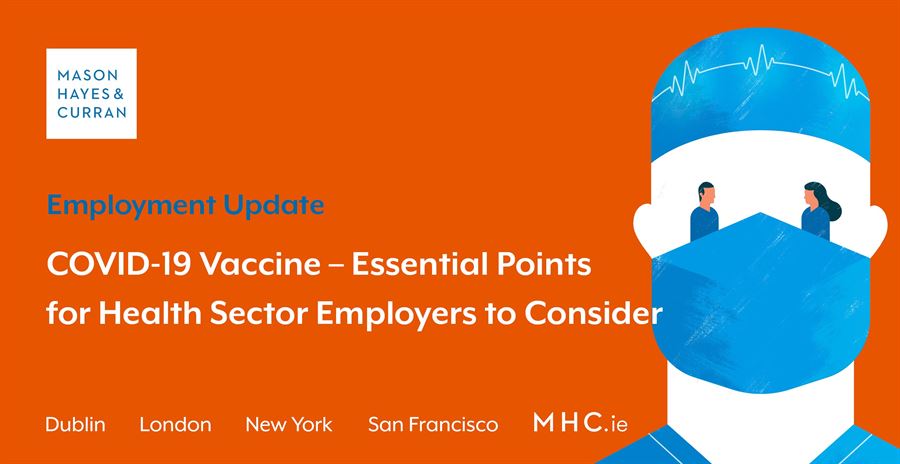
As employers have been reminded repeatedly during the pandemic, they have an obligation to their employees to provide a safe place of work. The vaccine rollout is likely to present both opportunities and challenges for employers in the provision of a safe place of work, particularly in workplaces such as hospitals and nursing homes.
We highlight some issues that employers need to be aware of.
There is no requirement for employees to receive the vaccine
While employers can encourage employees to receive the vaccine, it is important to highlight that employers realistically cannot mandate their employees to receive it. Rights such as bodily integrity, autonomy and privacy are protected by the Irish Constitution. This means that a person has the right to not have their body/person unjustifiably interfered with, which could include receiving a vaccination. Unless the Irish Government legislates that employees are required to receive the vaccine, which we believe is very unlikely, employers will not be able to require that their employees receive it.
However, in a healthcare setting, employers could strongly recommend that employees take the vaccine. If an employee refuses, then the employer will have to assess the appropriate way to respond to that refusal in line with its health and safety and other obligations. As well as its obligation to provide a safe place of work for its employees, employers in the health sector must also be aware of their obligation to those who are not their employees. In this case that would mean patients and service users. It will be necessary to conduct a thorough risk assessment to determine the appropriate solution. For example, the risk assessment will distinguish between administrative staff who have the possibility of working from home and staff working in wards or clinics.
The results of any risk assessments should be communicated to employees and the employer safety statement should be updated to outline that employees are strongly encouraged to receive the vaccine. The employer will also need to prepare a risk assessment to consider health and safety measures that may need to be taken in a workplace where some employees have had the vaccine and others have not.
Assessing if employees have received the vaccine
Whether or not it is permissible to ask employees to disclose they have received the vaccine or not will depend on public health guidance in place at the time.
Generally, employers need to have a strong justification for asking employees to disclose personal health information and the request needs to be necessary and proportionate. In simple terms, if an employee is required to work in a high-risk setting, such as a hospital or nursing home, it may be considered necessary to ask if they have received the vaccine. On the other hand, it may not be necessary and proportionate to ask an employee who has always worked from home if they have received the vaccine.
Continuing to work from home
Some employees may wish to continue to work from home, even if public health guidelines are amended to permit a general return to the workplace. Employers should be considering at this point whether they wish to facilitate remote working for some of their employees while the vaccine roll out is ongoing or, indeed, after the public health restrictions on movement have been significantly lifted.
Employers may also wish to request that any employees who refuse to take the vaccine continue to work from home, if possible. However, the employer needs to consider what they will do if the employee does not consent to continuing to work from home and wants to return to the workplace.
Risk of discriminatory treatment
If an employee refuses to take the vaccine on grounds which are protected against discrimination, such as gender due to pregnancy concerns, religion, or disability, they could take a discrimination claim against their employer. This may arise in instances where employees who have not received the vaccine are not permitted to return to the workplace but their colleagues who have received it are. Such employees could argue that they are being treated differently to their work colleagues because of their religious beliefs or gender, etc.
Alternatively, an employee could resign and bring a constructive dismissal claim, arguing that they cannot reasonably continue in their employment if they are mandated to take the vaccine by the employer.
Top tips for health sector employers
Employers need to consider how the rollout of the vaccine impacts their return to work strategy.
In summary, it is essential that employers:
-
Carry out or update a risk assessment to determine how necessary it is for their employees to have the vaccine. By way of example, if an employee works in a hospital ward it is more likely that the risk assessment will determine that it is necessary that the employee has received the vaccine as opposed to an employee who works from home.
-
Update their current COVID-19 response plan risk assessments and safety statements to account for employees having received the vaccine.
-
Keep employees informed of any relevant health and safety measures – there is no point in employers adapting comprehensive measures if these are not communicated clearly to employees.
-
Monitor public health guidance for information on how employees can receive the vaccine and any health and safety measures recommended for a safe return to work
Consider if working from home is to be facilitated for some staff members going forward and update policies on working from home accordingly.
For expert advice on all matters pertaining to a safe return to work for your employees, contact a member of our Employment & Benefits team.
The content of this article is provided for information purposes only and does not constitute legal or other advice.






